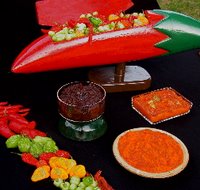Sub-Saharan African Cuisine in the media and the mind
How do people in the U.S. and Canada view sub-Saharan African cuisine? Do they even know it exists? I'm just back from Boston, MA and the annual conference of the ASFA/AFHVS (Assoc. for the Study of Food and Agriculture/Agriculture, Food, and Human Values Society) with my contribution towards answering that question. I shared results from my analysis of several recent years of the programs of 3 conferences I attend (in addition to ASFA/AFHVS conference, IACP conferences (Intl. Assoc. of Culinary Professionals), and an ASA, or African Studies Association conference). Also, a survey of dozens of issues of two popular culinary magazines, Gourmet and Saveur, shed further light on the subject of "western perceptions of sub-Saharan African cuisine."
I'll soon post my rough Powerpoint presentation at betumi.com for any who are curious for details and charts. However, to summarize:
* in 8 years of IACP meetings between 1997 and 2006, less than 1% (0.7%) were devoted wholly to Africa or an African country (only Jessica Harris and Fran Ossseo-Asare giving invited presentations),
* in 6 years of ASFA/AFHVS meetings between 2000 and 2006, only 4 papers of over 847 papers/posters. or less than 0.4%,were on African cuisine (2 of them given by Fran Osseo-Asare and the other 2 related to students discovering Somali and Ethiopian cuisine in the U.S., respectively). Overall, 1.8% of the papers were on food/Africa related topics (food insecurity, nutrition, development, imperialism, education, politics, etc.), but more on African food as problem that as cuisine.
* While searching through well over 100 pages of a pdf file of the 2004 program of the ASA I was unable to identify any papers about African cuisine where food was considered in its culinary sense (though one paper dealt with the novel Nervous Conditions, most likely with the issue of eating disorders).
* In 11 random issues of Gourmet between Feb. 2004 and Dec. 2005 there was one article on West African restaurants in the U.S., one brief travel article by Alexander McCall Smith on his trip to Botswana (not about the food), and a recommendation of a South African restaurant in Cape Town as one of the world's best.
* In 13 random issues of Saveur: Savor a world of authentic cuisine, between Dec. 2003 and May 2006, there were 2 articles devoted to African cuisine (1 article on coffee in Coche, Ethiopia (~3% of that month's issue), and 1 on Durban South Africa's ethnic Indian population (~2% of that month's issue), and 1 page of a 10-page article on peanuts considered Africa's contributions. There were a few other mentions of Africa, but of 1372 pages, but that was only about 6 pages, or ~0.4% of the total.
Clearly, there's a huge challenge for those of us who want to share the delights of African cuisine with a wider audience, and to get it taken as seriously as other world cuisines. We need to write books and articles, give cooking demonstrations, request more African foods in our grocery stores, champion changes in culinary curricula and restaurant offerings. Also, we need to form an alliance of all the actors involved with African food as culinary professionals outside of Africa: caterers, farmers, food processors, chefs and restaurant owners, food writers, culinary professionals of all types. BETUMI: The African Culinary Network is in the process of organizing such a professional association for African Culinary Professionals (maybe African Culinary Professionals in the Americas, or ACPA (except that there are also ACP folks in the U.K. who would like to join, so maybe it could stand for African Culinary Professionals Abroad).


